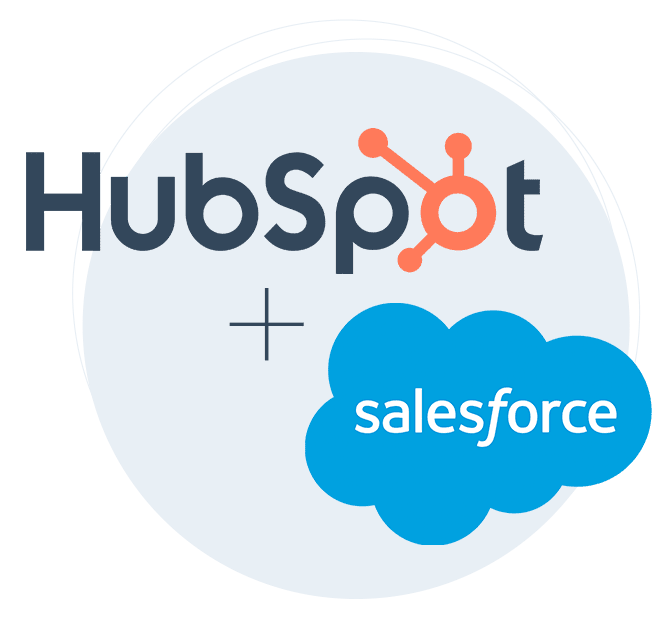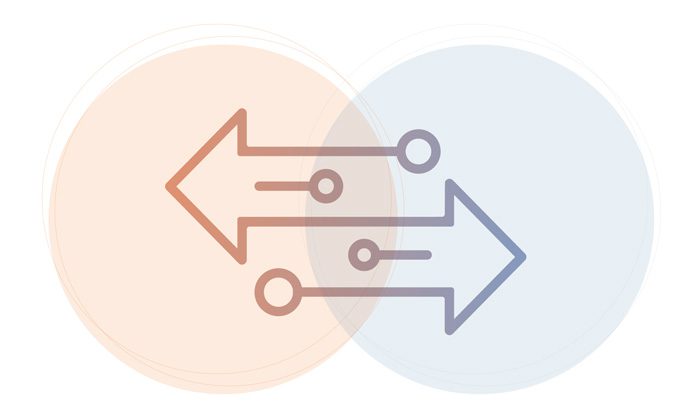Better HubSpot and Salesforce Integrations

Rocket Fuel for Your Sales and Marketing
Goldstein Group Communications offers seamless integration of HubSpot and Salesforce — a critical element for ROI reporting and a challenge for even the most tech-savvy companies.
A keen understanding of your unique sales and marketing processes ensures that data flows between systems at the right time and in the right ways to produce actionable insights that drive conversions. Through meticulous data mapping, custom field integration and polished reporting dashboards, we can enhance the ROI of our customers’ marketing and sales efforts with an integration that delivers results.
We begin with client goals – their main aims and outcomes desired from this integration. This guides the mapping project that enables comprehensive integration. We dive into a deep understanding of your sales process, technology and sales lead timing for entry into the chosen CRM to create an upfront strategy prior to the actual integration. Integration emphasizes connectivity, rather than treating your CRM and marketing automation as isolated, redundant systems.
Then, by methodically connecting each component, we are able to use one HubSpot-Salesforce integration project to drive insights across multiple channels – which outreach efforts are converting to Sales Qualified Leads (SQLs), high-performing email campaigns and more. These analytics help fine tune marketing efforts to achieve greater results, to increase the return on investment for your efforts.




Key Benefits of Integrating HubSpot with Salesforce
Integrating HubSpot with Salesforce can significantly enhance your sales and marketing efforts. Here are some of the key benefits:
Unified Customer View: Get a 360-degree view of your customers by combining marketing interactions from HubSpot with sales data from Salesforce.
Improved Lead Management: Seamlessly transfer leads from marketing to sales, ensuring no opportunity falls through the cracks.
Enhanced Reporting and Analytics: Generate comprehensive reports that show the full customer journey from initial touchpoint to closed deal.
Improved ROI Tracking: Accurately attribute revenue to specific marketing campaigns and activities.
Consistent Data: Ensure both sales and marketing teams are working with the same, up-to-date information.
Personalized Communications: Leverage data from both systems to create highly targeted and personalized marketing and sales communications.


Solid HubSpot Integration with Investigative Discovery
We solve data dilemmas for even the most complex sales and marketing stacks. Unlike other agencies that provide cookie-cutter solutions, GGC designs custom integrations from the ground up and offers full-service marketing strategies and tactics to optimize your integration results.
Since HubSpot and Salesforce are common CRMs utilized by many of our customers, this integration service releases comprehensive data reports that can benefit any customer within the technical spaces, including many of the segments that we serve:
- Manufacturing
- Processing
- Electronics
- Scientific instruments
- Industrial automation
- Professional service industries
But that’s just the foundation. Our integration services elevate your entire sales and marketing operation, delivering actionable insights that move prospects from initial touchpoint to closed deal with unprecedented efficiency.




Data-Driven Strategy
An integration strategy must be created in tandem with business objectives, with each informing the other. Currently a CRM not connected to marketing or ERP platforms functions as a disjointed system, with no insight into sales efforts as compared to marketing efforts.
By investigating your unique sales processes, marketing workflows and reporting needs, we identify pain points that already exist, and build plans aimed at eliminating data silos and information gaps.
From there, GGC creates HubSpot-Salesforce integration plans to target all stages of the funnel. While many companies have basic contact syncing, they struggle to generate the sophisticated, bi-directional data flows needed to nurture prospects toward a buying decision and accurately measure marketing’s impact on revenue.


Launch Your HubSpot Integration Today
Ready to ignite your growth? Let’s integrate your way to better insights, better ROI and better business outcomes. With countless successful HubSpot implementations, GGC’s Platinum Level VAR status and more than 30 years as a trusted B2B marketing strategic partner, GGC has the expertise to propel your sales and marketing teams to new heights.


Frequently Asked Questions
What is CRM and marketing automation?
CRM (Customer Relationship Management) and marketing automation are two distinct initiatives that drive B2B marketing and sales campaigns today.
CRM software tools such as Salesforce or HubSpot help company sales teams build and manage their sales pipelines. In advanced organizations, they also are used to manage ongoing communication with companies even after they’ve become customers. The goal is to drive sales growth, create more efficient and focused sales activities, improve customer service relationships and assist in customer retention.
Is Marketing Automation an AI?
Artificial Intelligence can enhance marketing automation by making it more intelligent and effective. For example, AI can optimize ad campaigns for performance without human intervention, create new ad formats and deliver more personalized ads to users.
Marketing automation software is not an AI tool, although it includes new AI functionality designed to improve its use. Marketing automation software is designed to help marketers target prospects, build campaigns, convert leads into sales and communicate to customers in ways that deepen relationships with companies.
Who uses marketing automation?
Marketing automation is widely used in both the B2C and B2B sectors. Marketing automation is widespread among leading B2B companies today. It is a staple and foundational platform used to manage the many and disparate activities used by marketers, from search marketing to social media to email campaigns to websites to content initiatives. In many cases, there are simply far too many initiatives taking place without a centralized software tool to manage and drive efficiency.
Many B2B companies are setting aside new funds for marketing automation technology, and for technology in general. The 2024 Deloitte Chief Marketing Officer survey noted that 20% of marketing budgets are spent on technology, which includes marketing automation software.

